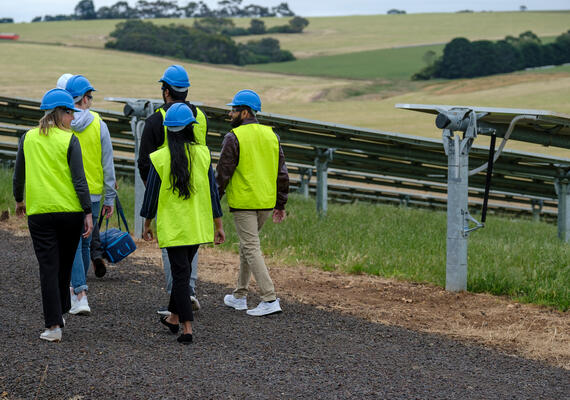
The largest solar farm on campus
The renewable energy microgrid is the largest solar farm installed on an Australian university campus, covering 14 hectares, with over 20,000 solar panels and energy storage working and supplying electricity.
Deakin’s renewable energy microgrid is providing substantial returns through research, teaching and learning opportunities. It is also a key element of Deakin's commitment to a sustainable future.
In addition to contributing to Deakin University’s commitment to reducing our greenhouse gas emissions, the renewable energy microgrid provides our researchers with an unparalleled opportunity to participate in important energy research in Australia and globally.
The project, delivered in partnership with AusNet Services and Mondo Power, is a combination of a seven-megawatt solar farm, 0.25-megawatt solar generation and storage across the rooftops of campus buildings and Australia’s first grid-connected megawatt-scale lithium iron phosphate battery.
Along with the Microgrid Visualisation Centre, the project forms part of the Geelong Future Economy Precinct at the Geelong Waurn Ponds Campus.
In response to a changing climate, the global energy sector is undergoing a rapid transformation as governments, corporations and communities look for sustainable power generation options that can also support economic growth. The renewable energy microgrid transforms the campus into a ‘living laboratory’ that demonstrates the viability of microgrid applications and also meets the University’s own sustainability goals.
In their 2017 Electricity Network Transformation Roadmap report, the CSIRO and Energy Networks Australia identified microgrids and other standalone power systems as integral to keeping our grids stable as we transition to renewable energy. The report predicts that, in some cases, these systems could even be a cheaper alternative to traditional grid supply.
Without a full-scale facility to research the viability and reliability of microgrids, questions about transitioning to new power systems will remain. Deakin’s renewable energy microgrid is an investment in resolving this uncertainty.
Conducted in collaboration with industry partners, early research is directed at projects including:
The renewable energy microgrid forms part of the Geelong Future Economy Precinct at Geelong Waurn Ponds Campus and is capable of supplying 54% of the campus' power usage.
According to the 2019 carbon emissions profile, 79% of Deakin’s emissions came from using electricity. The microgrid is capable of supplying 54% of the current power consumption on the Geelong Waurn Ponds Campus, reducing 12,000 tonnes of greenhouse gas generated on-site each year. Importantly, the microgrid’s presence on campus focuses the University’s attention on energy efficiency and how to implement further measures across its campuses.
There are also research, teaching and learning opportunities for students. Deakin’s research seeks to understand a microgrid from both ‘behind the meter’ (within the campus network in our case) and within a defined community with differing demands from manufacturing facilities, corporate offices and accommodation. The research will address technical and commercial questions, and importantly, social challenges – such as equity and participation in the new opportunities presented by the technology – will also be considered.
The outcomes of the research will also enable Deakin to understand and better manage our own energy use. This knowledge is already being shared with our communities and stakeholders.
The Microgrid Visualisation Centre is the perfect venue to train the energy professionals of the future and will offer students enhanced work-integrated learning and internship opportunities with industry partners. By showcasing the project for industry and community innovation, the research and knowledge developed will provide industry guidance. Working with researchers and industry in developing the system further in the future, Deakin seeks to discover other technological possibilities for the microgrid, such as hydrogen storage and electric vehicle integration.

The renewable energy microgrid is the largest solar farm installed on an Australian university campus, covering 14 hectares, with over 20,000 solar panels and energy storage working and supplying electricity.
Deakin University's microgrid offers new research and development opportunities for industry, with the potential for on-site testing of new PV panels, batteries and optimisation models. It also offers commercial opportunities to Deakin itself through participation in electricity markets such as the provision of ancillary services.
This article was published by Deakin University. Read the original article here.